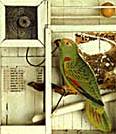- *18 July 1937
+22 February 2005
Chief Gonzo

Terms of Use [PDF]
San Francisco Chronicle's coverage last year
Fear, Loathing, and Great Reporting
Dr. Hunter S. Thompson is most remembered for over-the-top writings and personality. But it's worth remembering that he was also a damned fine reporter, with a gift for details and one of the best crap detectors in history.
by Sam Smith
(February 22, 2005)
-- One of the brightest lights in the American firmament blinked out Sunday. Word of Hunter Thompson’s death arrived at our house via the crawl on the network happy news this morning, and there’s irony enough in that fact alone.
Hunter Stockton Thompson, the Good Doctor, is most remembered for his over-the-top tours des excès – "Fear & Loathing in Las Vegas" being the most famous. But it’s not the gonzo high spots I’ll remember him for. What has gotten so lost in the legend that Thompson became (and the self-parody he sometimes lapsed into later in his career) is that he was a damned fine reporter.
Forget gonzo for a second. Before HST became an icon of the New Journalism he was an exceptional practitioner of a more conventional journalism, something that’s evident to anybody who’s read the early works collected in "The Great Shark Hunt: Gonzo Papers, Volume 1."
Thompson had a gift for the details and one of the best crap detectors in history. His flawless nose for the truths, dynamics, and motivations driving the players starring in his stories lent those narratives a quality that somehow fused unflinching naturalism with sweeping mythology.
Read "A Southern City with Northern Problems," for instance, where Thompson examines the issue of race in his native Louisville:
"The white power structure has given way in the public sector, only to entrench itself more firmly in the private. And the Negro -- especially the educated Negro -- feels that his victories are hollow and his 'progress' is something he reads about in the newspapers. The outlook for Louisville’s Negroes may have improved from 'separate but equal' to 'equal but separate.' But that still leaves a good deal to be desired."
Read "Hells Angels," Thompson’s landmark study of one of America’s unique subcultures. This wasn’t just exceptional journalism, it was some of the best scholarship I’ve ever read. It was ethnography, the anthropological study of cultures, and whereas some anthropologists study the rites, rituals, and folkways of natives in exotic faraway jungles, Thompson studied the rites, rituals, and folkways of natives living in exotic faraway Oakland, Calif.
Read "Fear & Loathing on the Campaign Trail," which remains perhaps the greatest political book I’ve ever encountered. While Thompson became famous for harpooning Nixon -- "a swine of a man and a jabbering dupe of a president [who] was so crooked that he needed servants to help him screw his pants on every morning" -- "Campaign Trail" made clear that you didn’t have to pick sides. He lashed on the Democrats more violently than he did Nixon, in fact. And for good reason. There’s plenty of ineptitude and corruption in both camps, it turns out -- a lesson America circa 2005 would do well to learn.
As tragic as Thompson’s death is -- has there been a time when we needed his honesty and brutality more than we do now? -- I was somewhat heartened by the explosion of tributes around the Web yesterday. My e-mail box was buried by individual notes and list mailings from all directions, with some issuing from journalists saying they’d never have become reporters in the first place without his influence. Almost every blog I checked had, at the very least, a link to an obit, which is more than appropriate given how important, how absolutely essential the pioneering work of people like Thompson and Wolfe has been to the brand of interpretive journalism being practiced in the more enlightened corners of cyberspace.
Further, his death arrives at a moment when the journalism industry is finally starting to contemplate issues that Thompson was railing about four decades ago. A number of very serious figures in the field have recently begun examining the repeated failings of objectivity in the press, with one -- Geneva Overholser of the Missouri School of Journalism -- telling The Hartford Courant that 2004 was "the year when it finally became unmistakably clear that objectivity has outlived its usefulness as an ethical touchstone for journalism."
Hunter tried to teach us that objectivity is a rule set that can be gamed, corrupted, and shaped into a weapon for use against the very principles it was developed to protect. He tried to teach us that fact and truth aren’t the same thing. Quoting Faulkner, he noted that "the best fiction is far more true than any kind of journalism -- and the best journalists have always known this." He set an uncompromising determination to get at the truth ahead of what he saw as artificial rules and conventions, and if the "facts" got in the way of the truth, well, that told you something about the facts, didn’t it?
Although I never heard him say it in these words, Hunter S. Thompson I think understood the artificial Red/Blue, Conservative/Liberal divide that most Americans seem to have bought into for the cynical construction that it is -- a rhetorical fluff job that turns Americans with common cause against each other and that serves the power elites in both parties to the detriment of the public they take turns fleecing.
In short, Hunter Thompson was a champion of the common people. Yes, his reporting was so crazed at times that you couldn’t be sure if you were reading an eyewitness account or a drug-addled hallucination. But he remained to the end one of the most unswervingly ethical reporters of our generation, a man whose commitment to social justice and the public good trumped everything.






No comments:
Post a Comment